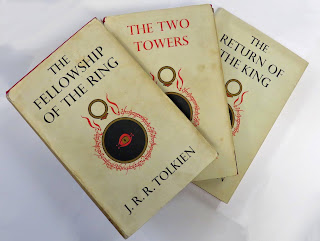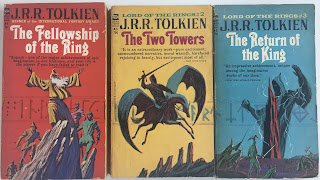Trawling Through The Thrift Stores with Joseph Finn
Happy Friday, everyone. Sorry about dropping the ball yesterday, but I had some bug and spent most of the day sleeping or in a DayQuill haze. But I'm much better this morning! Now, because of that and other reasons, I didn't buy anything this week but looking over my shelves my eye alighted on something I already have, so let's talk about...the unauthorized Lord of the Rings books!
The Allen & Unwin first edition, which can go for $30,000
So back in the late '50s, Houghton Mifflin (HM) was getting ready to become the hardcover publisher of LOTR in the USA, taking over from the UK publisher Allen & Unwin (A&E). HM would print the majority of it in the United States, importing certain materials from A&E and binding them here. All well and good, Tolkien was getting paid, everyone would be happy.
The Houghton Mifflin first edition
A few years after the HM edition was published, enter Donald A. Wollheim, the science-fiction editor for Ace Books. Exploiting a copyright law loophole (as he perceived it) that if HM was importing part of the books from the UK then they had not correctly registered a copyright for LOTR in the USA, Ace slapped together a paperback edition in 1965 and rushed it to market.
The 1965 Ace editions
Cue chaos. HM rightly objected, Tolkien started writing sternly-worded letters to fans to drum up support (imagine this situation in a world of Twitter) and rumblings of lawsuits ensued. It all became eventually resolved (Ace ceased publication and sent Tolkien a nominal fee) but it's one of those things that had some odd repercussions in editions for a while.
The 1965 Ballantine paperbacks
Later in 1965, Tolkien undertook some minor structural revisions in conjunction with HM so that they could publish a new edition in the US and firmly establish their copyright, and then Ballantine put out their own paperback editions (which is where the series really took off in the USA, especially in the counterculture of college campuses at the time). Unfortunately, this edition has some weird typographical and formatting errors that continued for a while until finally in the 2000s everyone buckled down and corrected a bunch of them that had been submitted by readers over the years (long after Tolkien's death in 1973; his son Christopher, who famously controlled his literary estate with an iron fist, oversaw that along with HM).
The 60th Anniversary edition
Who knows? Maybe there will be even more revisions with the 70th anniversary (but with Christopher Tolkien passing away last year, this might be time for some calm).





Comments
Post a Comment